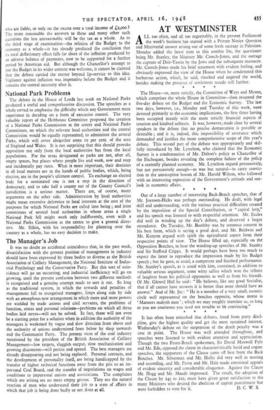AT WESTMINSTER A LL too often, and all too regrettably, in
the present Parliament the week's business has started with a Private Notice Question and Ministerial answer arising out of some fresh outrage in Palestine. Monday added the latest item to this sombre list, the questioner being Mr. Stanley, the Minister Mr. Creech-Jones, and the outrage the capture of Deir-Yassin by the Jews and the subsequent massacre. Mr. Creech-Jones made his brief statement with evident feeling, and obviously expressed the view of the House when he condemned this barbarous action, which, he said, shocked and angered the world,
besides making the prospect of settlement recede still further. * * The House—or, more strictly, the Committee of Ways and Means, which comprises the whole House in Committee—then resumed the five-day debate on the Budget and the Economic Survey. The last two days, however, i.e., Monday and Tuesday of this week, were devoted primarily to the economic implications, the first three having been occupied mainly with the more strictly financial aspects of taxation and kindred subjects. It was, however, made clear by several speakers in the debate that no precise demarcation is possible or desirable ; and it is, indeed, this impossibility of severance which demanded and justifies the more comprehensive scope of this year's debate. This second part of the debate was appropriately and skil- fully introduced by Mr. Lyttelton, who claimed that the Economic Survey is a condemnation of Mr. Dalton's policy as Chancellor of the Exchequer, besides revealing the complete failure of the policy of a centrally planned economy. Mr. Lyttelton argued persuasively, but not persuasively enough—as was but natural—to carry convic- tion to the unreceptive bosom of Mr. Harold Wilson, who followed with an interesting exposition of the Government's attitude and out- look in economic affairs. * * * * Out of a large number of interesting Back-Bench speeches, that of Mr. Joynson-Hicks was perhaps outstanding. He dealt, with legal skill and understanding, with the various practical difficulties created by the imposition of the Special Contribution, or " capital levy," and his speech was listened to with respectful attention. Mr. Eccles did well in winding up the day's debate, and deserved a larger attendance. On Tuesday, Mr. Boothby was by common consent in his best form, which is saying a good deal, and Mr. Baldwin and Mr. Kenyon argued with spirit the agricultural aspect from their respective points of view. The House filled up, especially on the Opposition Benches, to hear the winding-up speeches of Mr. Stanley and Sir Stafford Cripps. It would perhaps have been too much to expect the latter to reproduce the impression made by his Budget speech ; but he gave, as usual, a competent and finished performance. Mr. Stanley's speech, as is usual with him, contained, in addition to valuable serious argument, some witty sallies which won the tribute of laughter from his political opponents as well as from his friends. Of Mr. Glenvil Hall he said : " He believes, like any good Socialist, that if all cannot have answers it is better than none should have an answer." And of Mr. Jay : " He is a member of a very small, esoteric circle well represented on the benches opposite, whose motto is ' Manners makyth man' ; which we may roughly translate as, so long as you are courteous you need not trouble to bre convincing." * * * *
It has often been remarked that debates, freed from party disci- pline, give the highest quality and get the most sustained interest. Wednesday's debate on the suspension of the death penalty was a case in pbint. The House was well attended throughout, and speeches were listened to with evident attention and appreciation. Though the two Front-Bench spokesmen, Sir David Maxwell Fyfe and Mr. Ede, opposed the clause in characteristically lucid and cogent speeches, the supporters of the Clause came off best from the Back Benches. Mr. Silverman and Mr. Hollis did very well in moving and seconding, and Mr. Paton and Mr. Hale made emotional appeals of evident sincerity and considerable eloquence. Against the Clause Mr. Hogg and Mr. Maude impressed. The result, the adoption of the Clause by 245 to 222, must have given great satisfaction to the many Ministers who desired the abolition of capital punishment but






























 Previous page
Previous page